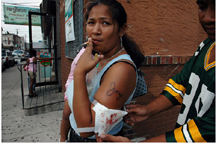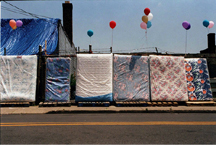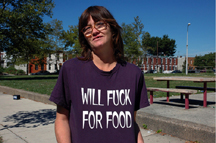|
Philadelphia-based photographer
Zoe Strauss is, in her own words, "blowing up...holy fuck!"
It has been a big year for Strauss, and there’s no sign of
the next one slowing down to anything below break-neck speed. Her
passion seeps into her photographs and ambitious large-scale public
projects that depict the local flavor of South Philadelphia and
its environs. It is easy to get swept up in her enthusiasm for everything
in general and nothing in particular.
When she turned 30, she set into motion a plan
to spend the next decade documenting the characters that comprise
the street narrative of her hometown. Every year since 2000, Strauss
has been hijacking the space underneath the Interstate-95 ramp for
an afternoon to display her photographs. Now over halfway into the
ten-year project, she has a lot to show for herself. The annual
exhibition creates a buzz in Philadelphia, and her guerrilla tactics
have garnered her critical acclaim and recognition from organizations
such as the Pew Charitable Foundation, Philadelphia Museum of Art,
Institute of Contemporary Art in Philadelphia, and most recently,
the Whitney Museum of American Art. Despite mixed reviews of the
2006 Whitney Biennial, Strauss has consistently been named a stand
out in the press.
I first met Zoe Strauss in March 2005, when
a mutual friend brought me to her studio on Passyunk Avenue. The
walls were covered from floor to ceiling with prints that she was
evaluating for her fifth ‘Under I-95’ exhibition, scheduled
to hang two months later. Freshly incised tattoos, grinning locals,
crack whores, and decrepit buildings lined the interior of the storefront
studio, displayed nakedly before the discerning eye of their creator.
The end result of Strauss’ deliberation was an exhibition in
which she affixed 231 photocopied images to concrete pillars, selling
prints for $5 apiece.
Strauss lives through a series of frenetic moments–a
lifestyle that is ascertainable in her photographs and her personal
blog entries. In the midst of moving into a new studio and preparing
her Whitney Biennial slide show installation, Strauss found some
time to speak with me about her craft.
Christina Vassallo: How's the move going?
Zoe Strauss: You couldn't believe how good the studio is.
It's on a fully integrated block in South Philly with neighbors
who really get along. It's remarkable actually. They're all running
in and out of each other's houses like, "hey, what's goin'
on?"
CV: Do you get to keep all the furniture?
ZS: Oh yes I do. It's so unbelievable. I don't know what
to do though, because when you're in that spot, you don't want to
change anything.
CV: It sounds like a Disney ride–a total experience.
ZS: And there's no turning back from it. You're already
on Magic Mountain. You're strapped in.
Strauss documented the trials and tribulations of searching
for a suitable live/work space on her blog for weeks. She is remarkably
candid about a range of topics, from her love life to her prescription
medications. The blog serves to keep the interested public informed
of her daily activities and also functions as an extension of her
photographs. It often becomes a forum to discuss prescient local
and global issues. Strauss' written commentary on art and society
link her work to the tradition of documentary photography of the
1960s.
As Executive Director of the Public Art Fund, an organizational
umbrella under which she displays her photographs, Strauss maintains
a commitment to making her "searing, humanist portraits"
available in an environment that is free and open to the public.
Strauss' humanitarian interests go beyond finding the ingredients
for making affective photographs, though. Days after Hurricane Katrina
ravaged the Gulf Coast, Strauss was there -- not only to portray
the suffering and hopelessness that had overtaken the area but also
to hand out necessities. She reported the experience on her blog:
I brought some medical supplies to this group
of doctors and nurses who just drive door to door seeing if
people need medical help. I passed out a lot of pads, and let
me tell you, ladies loved the pads…I am too overwhelmed
by the trip to know if I have any good photos. These are mostly
documentation, not fancy fine art and shit…The photos are
not representative of the size of this tragedy: they are details
of a kind of destruction that is beyond the ability to see it
fully, no less comprehend it. There’s no fucking way I
could represent the amount of physical devastation brought on
by the storm or accurately represent the ensuing man-made tragedy
of the Bush administration’s response to the devastation.
CV: Your blog is intense. You discuss your photos at length
and in such an illuminating way. Do you consider it to be part of
your art? It seems like it’s done in an effort to make art
more accessible to the public.
 |
| New Tattoo Jorge (Philadelphia, PA) |
ZS: I hadn't thought about it but it's very important to
me that people see each part of the process. From start to finish
you can see the whole thing. Yes, it's part of being able to see
the work that goes into it…the choices…the luck. All of
those things are part of it. And if I didn't have my blog I would
seriously never shut the fuck up. My honey just needs the rest.
It's a marriage saver. She's the greatest thing in the world.
CV: You manage to simultaneously abide by and reject all
technical and formal rules of photography, especially in your portraits.
There is an accidental and also an entirely deliberate quality.
You have described the rigorous editing process of choosing photographs
for your shows but the pictures in the larger context portray spontaneity.
How do you meld these opposing factors so seamlessly and sneakily?
Is it a conscious effort of pre-visualizing or a case of post-production
work and good editing?
ZS: It's actually both. The bulk is the post-production
work of choosing which image is best. There's a moment, though,
in which I see good form. A formal form, as well. Those are the
ones that I almost always use. That's kind of how I manage to get
the feel. There's no way of getting around the intrinsic quality
of spontaneity because it's literally in that moment. It's not a
sought out shot. It's in that second that I've just seen it; so
there's always that feeling, but I prefer formalism in terms of
the set-up of the photos in both the architectural studies and portraits.
I like to have a portrait that includes most of the trappings of
a traditional portrait. And then those are the ones that I generally
like the best, but because they're happening in that moment there's
always a sense of immediacy.
CV: Your awareness of formal techniques does not come from
your education. You just picked up a camera one day without any
training, right?
ZS: That's true.
CV: Natural talent is a freakish occurrence.
ZS: It's such a gift. I can see it but I can't articulate
it at all. There's no way to describe the internal process of how
I do it.
CV: Do you think it matters if you can't speak about it?
The photos speak for themselves, don't they?
ZS: I don't think it matters at all, but it's crazy that
I can't spit it out.
Although she denies being skilled at speaking
about her art, she will admit that speaking to people is something
that she does quite well. Strauss engages her subjects and effortlessly
convinces them to let her take photographs that portray their situations
in a truthful way, regardless of their candid or posed nature. She
makes the quotidian captivating, no matter how tragic the circumstances.
CV: I'm curious about how you get your subjects to let you
in and–on top of that–how you portray them in a way that
doesn't exploit them. They all have dignity in your photographs,
and I wonder how you are able to portray their world in a knowledgeable
way as an outsider.
ZS: For the most part I genuinely like all of these people,
and I have a very strong connection to them. They're like me.
CV: How are they like you? Where does this connection come
from? Is it from a sense of place–because you've lived there
all your life? The South Philly connection?
ZS: No, it's something that is literally indescribable.
It's not bound by place. I don't know what makes that connection
between these strangers and me. It's never something specific that
makes me think, "I better talk to that guy."
CV: What's apparent in your pictures is a reverence and
respect for your subjects and when somebody actually meets you,
they can tell that you love humanity. Your art and your personality…you
reach out beyond social isolation. The way you interact with people…
ZS: My lady keeps telling me to stop telling my realtor
that I love him. It's not the appropriate word to use but there
is something that makes me think, "I really love you Larry."
CV: How does he react?
ZS: "Oh babe, I love you too. I love you too, honey.
Doll, I love you." That's what I get. And there's no joking.
He's dead serious.
CV: The press release for the 2006 Whitney Biennial says
that the exhibition concept explores "the artifice of American
culture in what could be described as a pre-Enlightenment moment,
in which culture is preoccupied with the irrational, the religious,
the dark, the erotic, and the violent, filtered through a sense
of flawed beauty." Have you ever considered your photographs
in this framework or do you think that curators tend to create a
topic and then fit the work into it?
 |
| Camden Mattresses (Camden, NJ) |
ZS: It's an interesting thing. That is not how I would describe
my work, but I do think that it fits into the context of the rest
of the work that’s been chosen. So I think it makes a lot of
sense in terms of grouping my photographs with the other work, and
I think it describes an aspect of my work as well. It's a true statement
of the feel of some of my work. It's certainly not the bulk of it
or the focus of it, but it's a realistic description of what my
work says. It's actually kind of a shocker because I really didn't
know jack shit about anything as far as curation…
CV: But you curate your own massive show each year, so you've
got to know a little something about it.
ZS: Right! So that makes perfect sense. When I read the
press release, it made sense as to why I was going to be in the
show.
CV: So, what are you going to wear to the opening?
ZS: I don't know what I'm going to wear…I have no idea…and
then I got the invitation that says "festive dress."
CV: You should try to find the woman in your picture wearing
the "Will fuck for food" t-shirt. Could you borrow that?
ZS: Oh, yeah, I might see her this week. I am actually gonna
rock that. Oh my god! I don’t know, she might be in jail, but
I know her husband is around so I'll just ask him.
CV: Who is your favorite subject to photograph?
ZS: I don't really have a favorite subject…I feel like
it's partly because I'm doing it all the time. But I might actually
say Two Street is my favorite to photograph on New Year's Day, after
the Mummer's Parade.
CV: Those pictures are pretty phenomenal.
ZS: I genuinely love to be there so much. I think my on-the-fly
portraits are never my strongest at all, but that day is the day
that I like to be in it the most. It's festive, and it's also disgusting.
It's so ridiculous. The amount of grotesque open-mouth kissing that
you see is just mind-blowing.
CV: I think 'spectacle' is such an appropriate word for
your photos–and not just for the crazy ones where the mummer's
are pulling their dicks out of their pants–but also for the
quieter ones. The kids jumping on the mattresses, the trannies…their
whole identity is being a spectacle… at least for the moment.
It’s like you're giving them a platform.
ZS: There's an artifice and trying to get to the real self.
The presentation of self is really interesting to me. Sometimes
when people present themselves…despite the fact that it might
look like it's made up or false... it's really them as their truest
self. It's really hard, so go ahead with your bad self.
CV: …what people would notice first about you…what
it says about you and the other person. How do we contribute to
the way we are perceived?
ZS: It's very interesting. And it's how you are in the world.
That's it. That's what your life is.
CV: How do you want people to see you?
ZS: As myself. You know me.
Enter the Gallery >

|

